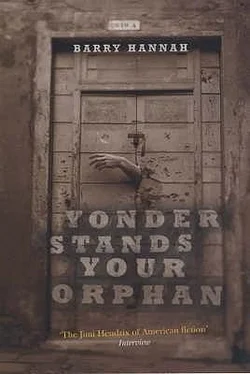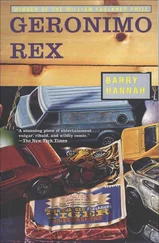They did not take pity on their mother’s private needs. Nor were they aware that she liked Harold in the least, which she did. He had even begun higher mechanics at the trade school. He brought down the swearing in the house. He threatened to play games with the boys. He was not proud of providing these children with such a garish rocket. His breakneck labor, his theft, which still had to be paid for. He cringed now when he thought he could get away with the switch. One was a car, the other a hulk of gummy decay.
Yet he was a husband and Dee was patient with him. Under other circumstances he would have been glad the boys were gone again.
Dee liked her boys more, but there was something smaller about her. She wondered if marriage to this stern young man would mean much to her living world, such as it was. She was always away in her visions now. She saw men burning, crying out, and now children, great filthy explosions, deep and shallow water in which there were corpses, all in the shell of Big Mart, bombed and half covered by water. Men cried for water and ran up to her and she spat fire at them. This was a vision, but it had a sleepiness to it, as if it were being carried on by her closed eyes into night dreams. She began watching the color television that Mortimer had given her long ago, asking that it imagine her, because she was afraid. She had great anxiety, and the sight of Harold in his school clothes, with loafers and sweaters, would send her into such a foreign mood, she could not imagine how to address this young stranger, the boy naked in the bed beside her.
The boys were good fishermen when they bothered. Their gear was at the lost lake. It was a tiny oxbow lake three hundred yards from the rear of the bad restaurant, whose food exhaust could be smelled still, even here. Nobody was home at the Raymonds’, and they killed the time fishing, hardly saying a word.
The boys had spin-cast reels and a newish Shakespeare bait caster. Bless all the gambling failures and crack addicts, a man could really shop in the pawn. Were the laws not just a little too stiff, you’d probably have found used children there.
The boys kept the rods leaned to a tree at the little lake. They had discovered the place. Nobody else came. They cast with a single bait, never changing lures, the old Lucky Thirteen. If they could not hear the pop and see the strike of a big bass, they had no interest in catching one at all. They took five good bass in an hour. One of them was nine pounds. They did not eat much fish, and they released the others back into the black-green water. Then went back to their car, worn and with tight smiles. If they could see Mimi Suarez, it would be a fine day. They could go home soon.
“There must’ve been five orphans in that one tree watching us. Thinking we’re the car desperadoes. Didn’t think we’d even notice.”
“They scared the devil out of me, but I just kept on throwing,” said Isaac.
They were glad to be desperadoes, watched in secret by city children. The orphans were going outside the camp at will, several of them armed.
Harold and Sponce were hunkered down at the rim of the sinkhole, staring down at where the car had been. They watched and watched. As if the mother and son would come back to it, open the trunk in its mud and slip in again. So that their minds could get back to the moment and begin making order.
They were grave robbers, but who was it cared so much? Egan and Mortimer. Who cared so much that this ’48 hulk was swapped with another decent ’48? Mortimer. Who was after Jacob and Isaac in their custom-made red and gold teenage car? Mortimer.
Now they heard through Egan, who’d invited the newlyweds to church services, that Peden had whipped the hell out of Mortimer, who had come at him with a bat. But Hare was haunted by his own romance. In his serious college clothes, Hare was turning Christian under the influence of Egan. He and Dee attended church now.
About this time Harold lowered his head, and a high-grain bullet of less caliber than a.22, called a Bee, parted his hair and lifted it. They were not aware they were being shot at from an immense distance, and the pops seemed irrelevant to the tragic hole they now studied. There was no blood but a curious burn down the part of Harold’s hair. He could not account for this. He had been mad with lust and plans. Now that he was preaching to Dee, he was wild with guilt. He trembled when he recalled the bones still with meat on them. The unreported dead. It took a sort of Jesus to remember them, with that sweet smell, the ligaments draped down from the sockets. He heard the child’s screaming from his head wound once the wind started.
They sat on different pews.
Peden and Egan argued with Max Raymond about who owned a church. You couldn’t just buy them, although this one, owned by Reformed Presbyterians, was very much for sale by its richer child in Vicksburg. Raymond was going to buy it. He had promises of money, and a CD with his wife and band that was going somewhere. The band was ebbing at the casino, but they were getting gigs as far as Biloxi and New Orleans now. He had found some old doctor money he had forgotten, from his old drug days when he feared the worst at every turn. It was quite a lot. The firm paid you even for being high and invested wisely for you. Funny, the way he didn’t care for money and yet fell into it.
“You can buy a church. And you’d have to let me in if I bought it,” said Raymond.
“We’d let you in anyway. The definition of a church is open, isn’t it?” asked Byron Egan. He looked at Peden, because the junkman was nervous, his cheeks jumping.
“Nobody denies the wanderer,” said Peden. This didn’t seem quite on the mark. The three men shut up awhile.
“My emphasis would always be on acts, not chats,” said Raymond. “I have turned around on this matter and gone against Luther and the rest, I know. I’m not sure there was ever even a sect of me. Offshot from in fides sola . You can have a church without firm belief, is all I’m saying. Most churchmen can’t tell you what they believe anyway.”
“All right,” Egan said. “Christ himself said whoever is not against us is on our part, and he might know the church. Buy it. We stand. I and Peden have a church and the doors are wide open.”
“For none of us knows who lives tomorrow, who may tarry yet come the sun dead on his pillow,” Peden burst out. He rose from the pew as if delivering an involuntary oath and strode toward the trombonists gently tuning in the little chair gallery to the left of the pulpit. These five men were dark black and were cousins. They had no interest in recording or selling their music. Many said they blended like the best tea of heaven, and they could make you cry with their hymns. Only one read a note of music, and he was not the leader. The leader was James. He played the enormously belled bass trombone. Two others had valved trombones. So intense were these men in their harmonies that there seemed no other world for them.
Now the trombonists stopped and looked at Peden as if he were a goat wandering into their music.
“Say, men,” asked Max Raymond, with his instrument case between his legs, “you think I could sit in with you a few tunes? James?”
“No.”
The men, dropping the saliva out of their spit valves, looked at one another. “It ain’t no place to make your entrance,” said James. “Nor get out if you was in.”
“It be in there like a piece of hair on a bar of soap,” said another seriously. They were musicians but much like deacons too. They frightened Raymond a little. They began playing again, silvery, in trouble and then deliverance. One of them with the bell of his horn under the church light going gold to bronze to red.
Christ, we are your throat.
Читать дальше











